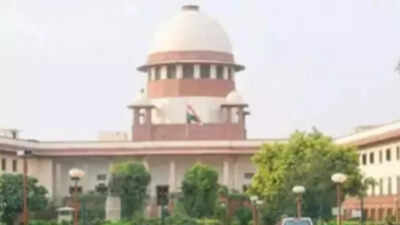Top Searches
- News
- India News
- ‘SC, HCs can’t interfere in daily temple rituals’
‘SC, HCs can’t interfere in daily temple rituals’
‘SC, HCs can’t interfere in daily temple rituals’

Supreme Court ruled that constitutional courts cannot interfere in daily rituals and practices in a temple
NEW DELHI: The Supreme Court on Tuesday ruled that constitutional courts cannot interfere in daily rituals and practices in a temple on the basis of a writ petition and said that if any devotee is aggrieved by any deficiency or violation of rituals she/he has to file a civil suit or approach an appropriate forum seeking relief.
“If a devotee is aggrieved by non-performance of any daily ritual properly or deviation from daily practices in a temple, he/she can file a civil suit or approach an appropriate forum for grievance redressal. The HCs and the SC cannot deal with it,” said a bench of Chief Justice N V Ramana and Justices A S Bopanna and Hima Kohli.
However, the apex court clarified that if a Devaswom Board or temple administration is failing in its duty to make proper arrangements for the devotees or indulging in maladministration of the temple, then a devotee could be permitted to seek redressal of her/his grievances before the HCs or the SC through a writ petition.
The ruling came on a petition filed by Srivari Dadaa, who had accused the Tirumala Tirupati Devaswom (TTD) Board of deviating from daily rituals. The Andhra Pradesh HC had on January 5 rejected the petitioner’s PIL and said, “procedure of conducting rituals is the exclusive domain of the Devasthanam and cannot be a matter of adjudication unless it impacts secular or civil rights of others”. TTD is an independent trust that manages temples including the famous Lord Venkateshwara Swamy temple, in AP. Dadaa has alleged that the temple authority has been performing sevas in a “wrongful and irregular procedure”.
Agreeing with the HC, the CJI-led bench said, “ the constitutional courts can’t start interfering with daily rituals of the temple and its customs and practices as it is not judicially manageable. Can we manage daily puja? Which law mandates that constitutional courts can interfere in daily rituals. Can we dictate to temple authorities how a coconut is to be broken in front of the deity? Can we tell the priests how to carry out aarti? This appears to be a publicity interest litigation.”
“If a devotee is aggrieved by non-performance of any daily ritual properly or deviation from daily practices in a temple, he/she can file a civil suit or approach an appropriate forum for grievance redressal. The HCs and the SC cannot deal with it,” said a bench of Chief Justice N V Ramana and Justices A S Bopanna and Hima Kohli.
However, the apex court clarified that if a Devaswom Board or temple administration is failing in its duty to make proper arrangements for the devotees or indulging in maladministration of the temple, then a devotee could be permitted to seek redressal of her/his grievances before the HCs or the SC through a writ petition.
The ruling came on a petition filed by Srivari Dadaa, who had accused the Tirumala Tirupati Devaswom (TTD) Board of deviating from daily rituals. The Andhra Pradesh HC had on January 5 rejected the petitioner’s PIL and said, “procedure of conducting rituals is the exclusive domain of the Devasthanam and cannot be a matter of adjudication unless it impacts secular or civil rights of others”. TTD is an independent trust that manages temples including the famous Lord Venkateshwara Swamy temple, in AP. Dadaa has alleged that the temple authority has been performing sevas in a “wrongful and irregular procedure”.
Agreeing with the HC, the CJI-led bench said, “ the constitutional courts can’t start interfering with daily rituals of the temple and its customs and practices as it is not judicially manageable. Can we manage daily puja? Which law mandates that constitutional courts can interfere in daily rituals. Can we dictate to temple authorities how a coconut is to be broken in front of the deity? Can we tell the priests how to carry out aarti? This appears to be a publicity interest litigation.”
FacebookTwitterLinkedinEMail
Start a Conversation
end of article
Quick Links
Coronavirus in MumbaiFarm bill 2020Farmers protestCoronavirus in DelhiCoronavirus in BangaloreCoronavirus symptomsCoronavirus in IndiaWest Bengal elections 2021Coronavirus NewsSolar EclipseNPRWhat is NRCCAB BillCAB and NRCAssam election 2021Podcast newsLok SabhaTamil Nadu Election 2021CongressBJP newsKerala Elections 2021Indian ArmyISRO newsSupreme Court

